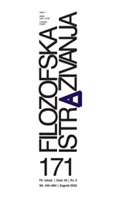Filozofsko uporište teorije socrealizma
Philosophical Background of the Theory of Social Realism
Author(s): Josip PerišaSubject(s): Aesthetics, Marxism, Theory of Literature, Sociology of Art, History of Art, Sociology of Literature
Published by: Hrvatsko Filozofsko Društvo
Keywords: social realism; regime poetics; aesthetic value; autonomy of art; Marxist aesthetics;
Summary/Abstract: The paper aims to present the philosophical background and justification of the theory of social realism. Social realism is a representative example of a literary period in which the autonomy of literature in terms of, for example, the aesthetic value of a literary work, was brought to a negligible level given the radical demands of regime poetics of writing in accordance with politics and ideology. Socialist-realism, poetics in which party writing and educating people in the form of socialist progress and without any concern about literary creation are paramount, finds its postulates in theories of the Union of Russian Proletarian Writers (RAPP) and proletarian cultural and educational organization (Proletkult). Theorists of socialist realism poetics claim that their postulates find philosophical justification in Marx’s and Engels’ texts about art. The primary subject of analysis in the article will, therefore, be the connection between the theory of social realism and the classical Marxist conception of art. Based on the analysis, it can be concluded that the theory of social realism is justified by classical Marxist aesthetics regarding historical materialism which determines art, but not in the sense of denying the autonomy of the art.
Journal: Filozofska istraživanja
- Issue Year: 43/2023
- Issue No: 03/171
- Page Range: 587-600
- Page Count: 14
- Language: Croatian

